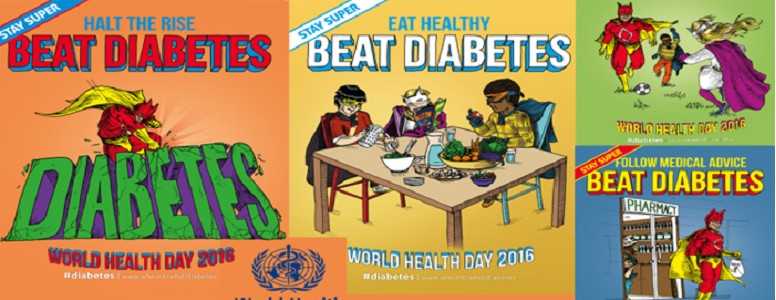The World Health Organisation (WHO) has selected “beat diabetes” as the theme of this year’s World Health Day.
WHO estimates that roughly 422 million people worldwide live with diabetes – type 2 diabetes is thought to account for 90 per cent of cases.
WHO, based in Geneva, Switzerland chose to focus on the rising rates of diabetes in order to prevent type 2 diabetes and provide better treatment for people with diabetes around the world.
What is World Health Day?
World Health Day, which is held annually on April 7, marks the anniversary of the founding of the World Health Organisation in 1948.
The first World Health Day occurred in 1950 and since then there has been a different theme each year. Each theme has aimed to educate people on an important global health issue – previous themes have included mental health, maternal health, food safety and road safety.
Changes
Worldwide rates of diabetes have nearly quadrupled since 1980, and an estimated 3.7 million deaths were directly attributed to diabetes in 2012.
WHO wants to curb the global diabetes epidemic. It has called for people to make simply lifestyle changes such as maintaining a normal body weight, eating a healthy diet and getting regular exercise to prevent the onset of type 2 diabetes.
The WHO has also called for “increasing access to diagnosis, self-management, education and affordable treatment” in low- and middle-income countries, where diabetes rates are particularly prevalent.
WHO Director-General Dr Margaret Chan said: “If we are to make any headway in halting the rise in diabetes, we need to rethink our daily lives: to eat healthily, be physically active, and avoid excessive weight gain.
“Even in the poorest settings, governments must ensure that people are able to make these healthy choices and that health systems are able to diagnose and treat people with diabetes.”
Type 1 diabetes cannot be prevented, but insulin remains costly around the world. While it is free for people with diabetes in the UK, the price of insulin is increasing in the United States, and many people in low-income countries struggle to afford it.
Dr Etienne Krug, director of WHO’s Department For The Management of NCDs, Disability, Violence and Injury Preventio, added: “Essential diabetes medicines and technologies, including insulin, needed for treatment are generally available in only one in three of the world’s poorest countries.”
The WHO is campaigning for insulin to be made more affordable for all people with diabetes across the world.
Picture: World Health Organisation/Metro.co.uk







